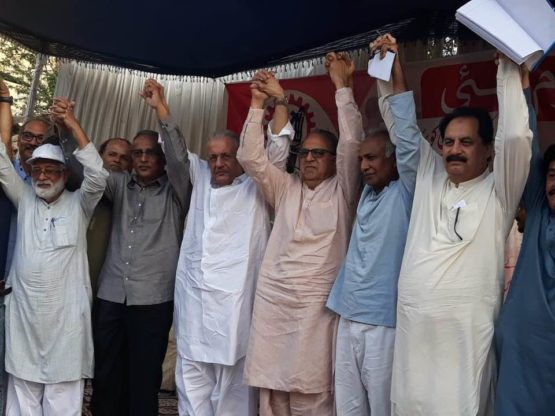- About
- Topics
- Story
- In-Depth
- Picks
- Opinion
- News
- Donate
- Signup for our newsletterOur Editors' Best Picks.Send
Read, Debate: Engage.
| August 06, 2015 | |
|---|---|
| topic: | Climate Change |
| tags: | #climate change, #Karachi, #Pakistan |
| located: | Pakistan |
| by: | Shadi Khan Saif |
Extreme weather and poor city planning claimed hundreds of lives in Pakistan City’s main public hospital; Jinnah Post-Graduate Medical Center (JPMC) and three other relatively small government hospitals were overwhelmed with patients; mostly elderly people from poor neighborhoods. Scenes at Karachi’s mortuary, the Edhi Center, were not much different from a war-zone where hundreds of coffins were lying all over the place.
Among the dead were some 150 unidentified people who were laid to rest by the Edhi volunteers. They are believed to be poor people living on the streets. The city of over20 million remained literally crippled for days in the later parts of June.
Dr. SeemiJamail, Head of the Emergency Ward in at (JPMC) told FairPlanet the prevailing situation was unprecedented.
“There is no respite, more and more patients with severe dehydration and sunstroke are being brought by the emergency ambulances,” Dr Jamali said. She added that the medics were doing all they can to save lives but the situation was very grim and often out of control due to the gloomy conditions of the patients.
Most of the casualties are caused by heatstroke and an acute shortage of minerals in patients’ bodies, JPMC officials said.
The provincial administration declared a State of Emergency in public hospitals, cancelling medical staff’s leaves and allocating additional quantities of medicines. The paramilitary Rangers force setup emergency support centres in the worst affected areas where people were provided with free water and medicine.
Saturday was the hottest day of this year’s summer in Karachi, when the highest temperature of 45 degree Celsius (113 degree Fahrenheit) was recorded. In recent years, this country of around 180 million inhabitants has witnessed unprecedented floods, irregular patterns of rains and now the summer calamity in Karachi, yet Climate Change remains a least discussed topic, analysts argue.
Climate Change not an “in” topic yet
MuhammaidHanif, Head of Pakistan’s Met Office, told local media that people in Karachi were actually feeling temperatures closer to 50 degrees Celsius due to the high humidity and low air pressure. “Normally, the sea breeze provides a pleasant relief to residents in coastal cities like Karachi but this time it has been quite different”, he said while mentioning that the city was having no wind from the sea during mid-June.
“Climate change is not getting serious attention despite a series of natural disasters in the recent years”, NaseerMemon, Chief Executive of the Strengthening Participatory Organization (SPO), a local aid organization working for disaster preparedness and response told FP.
“Policy makers are content that Pakistan is not a major contributor of greenhouse gases but they forget that Pakistan is among the few top countries on the climate change vulnerability scale,” Memon added.
Being one of the front line countries in the U.S.’ “War on Terror”, Pakistan has had its own set of troubles ranging from militancy, political uncertainty and growing disparity that often over shadow the threats to the environment.
On the part of government, Mushahidullah Khan, the country’s Minister for Climate Change, has added another possible reason for the calamity. Khan has blamed coal-power plants in the neighbouring Indian state of Rajasthan for the unbearable weather.
“The fallout effect of the coal-powered plants, in combination with other abnormal climate change events, possibly added to the already warm temperatures”, Khan told a moot in the capital Islamabad.
If proven true after detailed investigations, Khan has vowed to take the matter to the United Nations.
“The developed countries of the world who have caused global warming should help conserve environment and help Pakistan adapt to the altering climate,” Khan said.
Urban Planning Disaster
Pakistan faces an electricity shortfall of over 4500 Mega Watts that causes up to 10 hours of power breakdowns in many parts of the country. For many years, militancy, lack of electricity and poor governance dented economic growth leading to the capital flight and joblessness in various parts of the country.
SPO Chief argues that the catastrophe in Pakistan’s financial hub had other dimensions to it as well.
“The concrete jungle of Karachi is bereft of green spaces, trees have been slaughtered systematically, coastal forests have been ruthlessly cleared and the city is highly vulnerable to climatic shocks”, he said adding that higher number of casualties of elderly and labor class people also indicate social dimensions of the impact.
Karachi has evolved from a little fishermen village to one of the largest cities in the world but the town planning has not met the needs of this fast growing city.
Poor neighborhoods remained worst affected in this regard where lack of electricity also causes acute water shortage leaving thousands of “KatchiAbadi” (slum) settlers in unbearable circumstances. Most of heat-stroke casualties occurred in such communities living on the margins of the society.
By copying the embed code below, you agree to adhere to our republishing guidelines.
